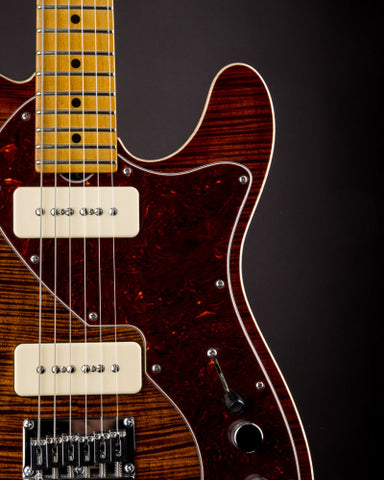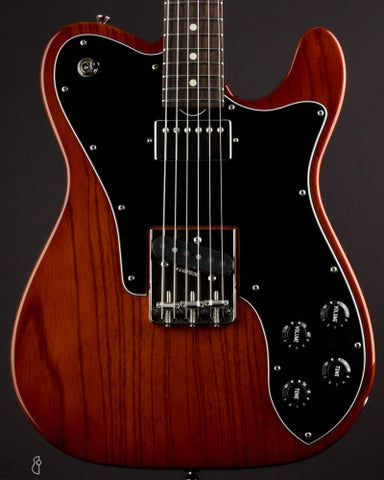
Don Grosh is making some of the best F-style guitars on the market (in our humble opinion). A mix of both new-school build techniques and old-school soul make Don's guitars ideal for players looking for higher performance out of their guitars, but not at the expense of feel, tone, and soul. We recently sat down with Don to learn more about Grosh guitars and the philosophy behind these amazing instruments.
For those who may be unfamiliar with your guitars, tell us a bit about how Grosh Guitars came about? What drove your decision to build under your own name versus working at Fender or Gibson?
I actually did work for another guitar company, Valley Arts Guitars in Studio City, CA from 1985 to 1992. At the time they were the premier custom guitar shop in Southern California, serving such amazing artist's as clients like Larry Carlton, Steve Luthaker, Lee Ritenour, and many more of the top LA session artists. Working at Valley Arts was an incredible experience, dealing directly with top LA studio pros really helped me establish what I wanted to offer with my own guitars. I felt I could really bring something special to the table that wasn't available in the overall guitar market at the time. In 1993 I started Grosh Guitars.
The impression I've always gotten from your guitars is that you possess a deep respect for tradition, namely the work of Leo Fender and Ted McCarty, but aren't afraid to improve upon their designs and move them into the modern age. What's the initial impression you want players to have when sitting down with one of your guitars for the first time?
My goal is to have a player sit down with one of our guitars for the first time and have the experience that this is a guitar that is very familiar, like they've been playing this guitar for a lifetime. As a builder, that means the whole package has to be complete - no loose ends or details forgotten about. For example, the overall feel of the neck and fretwork has to be the best, with impeccable playability. The balance and weight of our guitars have to be consistent and very pleasing to the player...all the guitars have to be resonant and acoustically alive sounding when strummed unplugged...all of our pickups have to have what I call the "Grosh Tone" - very balanced sounding with a full range of tone and character...pickups and electronics that will sound great with many different amps and many different styles of music, etc...
 |
 |
 |
Some very notable names play your instruments - Mark Knopfler, Steve Miller, and Mark Lettieri just to name a few. Given your previous work with Valley Arts, is it fair to say that a central goal at Grosh Guitars is to build more for professional players versus the "casual" player?
I actually love to build guitars for all types of guitar players. I've received positive feedback from both pro players and newer players that have had similar great experiences with our guitars. I think what makes me really happy is to hear from a casual player about how our guitar has helped and inspired them with their playing!
Your guitars are extremely well made and are actually quite modern upon deeper inspection - there are lots of well thought out touches under the hood. That said, the playing experience, the feel, is anything but modern. They possess a vintage soul, if you will. Which elements of a guitar are essential to achieving that balance?
I personally feel that all guitars should have soul, be it more on the vintage side or modern. The essential key for me is the overall build and design of the guitar. This includes the woods used and the weight and resonance of those woods. We definitely have a formula that we use when choosing the wood for our guitars.
For example, here's a few of the steps we follow: all of our raw wood is seasoned in our humidity-controlled shop for up to a year before the building process begins; each piece of wood is weighed and selected based on resonance and will be allocated based on our calculations for each different model; the body and neck construction, along with the type of woods used, are key for having a very resonant and acoustically alive sounding guitar.
In my opinion, this is the foundation for all great sounding guitars. From this stage, it's much easier to create a guitar that is more modern sounding, with options like rear routed control cavities, modern-style bridges, and more modern-voiced pickups and electronics.
Talk to me about your NOS line. After building the Retro line of guitars for so many years, guitars which aren't straight-up copies of Teles or Strats, did you have any reservations about building a more traditionally shaped F-style guitar? Did it feel unnatural or limiting for you to work within pre-existing designs?
In the beginning I wanted to establish myself as a builder with my own unique designs. Even though they were similar to some of the traditional designs, I wanted guitar players to recognize our designs as our own. For many years we were known for this with our original body shapes like our Retro Classic, Retro Classic VT, Carve Top Custom, Set Neck, and Electrajet guitars. After many years of doing our original models and receiving many requests from customers for the more traditional body shapes, I decided it was time to expand our range with our new NOS models.
We've incorporated the same strict building formulas for the NOS models, but also incorporated some other features that give these guitars a slightly different voice compared to our Retro models. For example, the NOS guitars have a vintage-style single truss rod and traditional body routings.
Don, what's the future of Grosh Guitars? Having been at the helm since the early '90s, what gets you excited about guitars and the future of your company? Any projects you've yet to tackle that are on the horizon?
We're really exited to re-release our Set Neck models which we started offering as a limited run this year (2017).
Beyond that, I feel very blessed to be doing what I love for over 20 years now. This started out as a hobby for me when I was 19. At that time I was using my parent's garage on the weekends for building and repairing guitars as well as making speaker cabinets and pedalboards. I was employed as a carpenter/cabinet maker at the time. If I weren't doing this for a living now, I would still be working on my pedalboards and guitar projects for myself. This is just something I really enjoy doing!
See some of Don's creations that have passed through our shop!
 |
 |
 |

